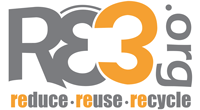 Guest Blogger – Laura McKinney
Guest Blogger – Laura McKinneyDoctoral student, Laura McKinney, and Professor Ed Kick from the Department of Sociology at North Carolina State University have partnered with the N.C. Department of Environment and Natural Resources on a grant-funded project, “A Partnership to Examine the Environmental, Economic and Social Benefits of Recycling in North Carolina Communities,” to determine which factors and features of recycling programs maximize participation (i.e., tonnage). Laura has completed a small-scale, preliminary statistical analysis of the effect of local government’s implementation of various recycling educational programs on tonnage. Laura has worked closely with Christopher Hansard (intern, DENR) on this pilot project. The results below serve as a stepping stone for further, more nuanced analyses of the annualized data; the findings may change once the more in-depth analyses are completed.
Using annual data gathered from more than 400 municipalities across North Carolina, we are able to draw broad conclusions on the effectiveness of various education programs on increasing recycling tonnage. After separating the municipalities into two groups—those that DO have an educational program in place and those that DO NOT have any educational program in place—it is found that those municipalities with ANY educational programs in place collect, on average, 2,132 tons more of recyclables than those with NO educational programs in place. This finding supports the efficacy of local governments engaging the public in ANY educational program to promote recycling participation—it really does pay off in terms of tonnage collected!
Further analyses look at the specific breakdown of various programs on increasing recycling tonnage. The findings bode quite well for the implementation of quite a few educational programs—that is, they significantly increase the amount of recycling tonnage collected! Here are a few of the specific predictions we are able to glean from this statistical analysis:
1. When a local government initiates grant programs for businesses, the model predicts an increase of recycling tonnage by 6,674 tons.
2. When a local government conducts award programs for businesses, the model predicts an increase of recycling tonnage by 5,997 tons.
3. When a local government conducts workshops, forums or conferences, the model predicts an increase of recycling tonnage by 4,847 tons.
4. When a local government provides a telephone “hotline” for recycling, the model predicts an increase of recycling tonnage by 2,198 tons.
5. When a local government produces radio or TV advertisements for recycling, the model predicts an increase of recycling tonnage by 1,401 tons.
6. When a local government produces mass mailings/utility bill inserts, the model predicts an increase of recycling tonnage by 1,027 tons.

No comments:
Post a Comment